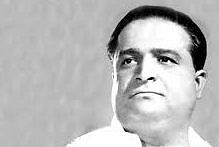
GaDiMa: The Legacy Remains
A tribute to the great Marathi lyricist GaDiMa.
One of the most iconic poets and lyricists in Marathi literature is Gajanan Digambar Madgulkar, known throughout Maharashtra as GaDiMa. His elder brother, Vyankatesh Madgulkar was a novelist, who acquired national fame with his novel Bangarwadi.
A prolific poet and lyricist, GD Madgulkar, penned over 2000 poems and more than 150 short stories. Born on 1st Oct, 1919, he died at a young age of 58 on 14th Dec, 1977. But the vast repository of the poems he left behind are legendary.
There would be no Maharashtrian, who would not have hummed his songs, whether the children’s songs like Nach re Mora and Mamachya Gavala Jayuya, or the philosophical song Jag He Bandishala, from the superhit movie Jagachya Pathivar.
It is impossible to classify GD Madgulkar in one genre as he wrote a wide variety of songs. GaDiMa’s poems have been adapted to a wide range of musical forms such as Sugam-Sangeet (light music), Bhāwa-Geet (emotional songs), Bhakti-Geet (devotional songs), and Lāwani (a genre of folk songs in Maharashtra). He was awarded the Sangeet Natak Akademy award in 1951 and the Padma Shree in 1969.
Madgulkar wrote poetry, short stories, novels, autobiographies and scripts, dialogues and lyrics for Marathi as well as Hindi movies. Very few people know that some of V Shantaram’s iconic movies like Do Ankhen Bara Haath, Navrang and Goonj Uthi Shehnai are GaDiMa’s stories.
Even Guru Dutt’s Pyasa and Amitabh Bachchan’s Black are supposed to be inspired by stories originally written by Madgulkar. It is not a well-known fact that GaDiMa wrote the story and screenplay for 25 Hindi films.
Perhaps the most lasting contribution of GaDiMa is the penning a set of 56 songs called Geet Ramayan, chronologically describing events from Ramayana. It is the evergreen combination of the melodious music and voice of Sudhir Phadke and the meaningful yet simple lyrics which have made Geet Ramayan as one of the most popular albums in Maharasthra.
Geet Ramayan has been translated into nine other languages like Bengali, Gujarati, Konkani, Sanskrit, Sindhi and Telegu and Hindi. Indian Express once called Geet Ramayan as the ‘crescendo of Madgulkar’s literary vigour.’
Madgulkar expressed the varied moods of Rama; he was the most-voiced character in the Geet Ramayan with ten songs, followed by Sita with eight. He portrayed Rama as a complex character full of emotions and passions, with some of questionable deeds, yet bound by a traditional virtue and the sanctity of a promise.
It is impossible for the listener not to have tears when Sudhir Phakde renders Paradhin Aahe Jagati, when Ram asks his brother Bharat to return to Ayodhya and rule till he returns. Each of the songs are known verbatim to most listeners yet they never get tired of listening to them; such has been its popularity ever since the songs were aired on All India Radio first in April 1955.
Geet Ramayan’s rendition has now become a regular feature in Maharashtra each year. The Silver Jubilee function and the Golden Jubilee function were attended by Atal Bihari Vajpayee.
GD Madgulkar the writer, Sudhir Phadke the singer and composer and Raja Paranjpe the producer and actor, created an unbeatable combination and led to the golden years in Marathi cinema. Some of the most memorable films and the songs thereof were produced by the trio, which till date remain as all-time favourites.
It was GaDiMa’s ability to pen songs in simple lyrics which made some of his children’s songs evergreen. At the same time, some of his devotional songs like Indrayani Kathi and Vithala Tu Veda Kumbhar, are most loved. Indrayani Kathi, sung by Bhimsen Joshi with music by PL Deshpande (PuLa) in a song which every Maharashtrian would know.
Coming from an extremely poor family, GaDiMa participated in the freedom struggle writing inspirational songs. After Independence, he was an active participant in the Vidhan Parishad for nearly 12 years. Many would attend the sessions simply to listen to GaDiMa speak!
The death of this ‘Modern Valmiki’ was a day of sorrow across Maharashtra but his legacy will carry on for generations to come.